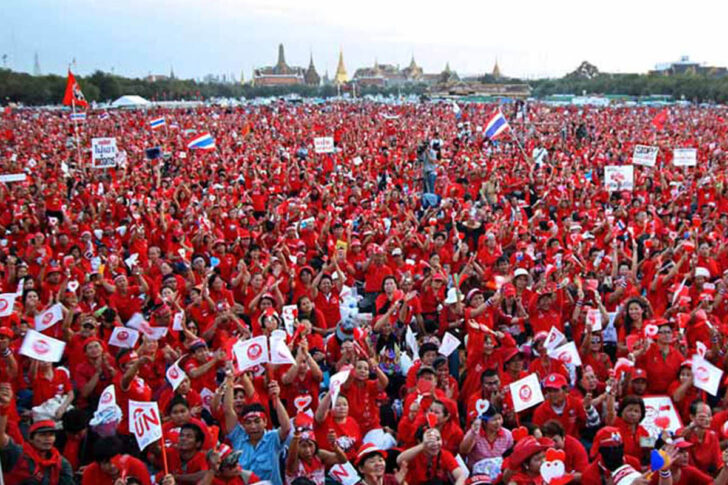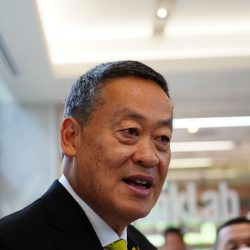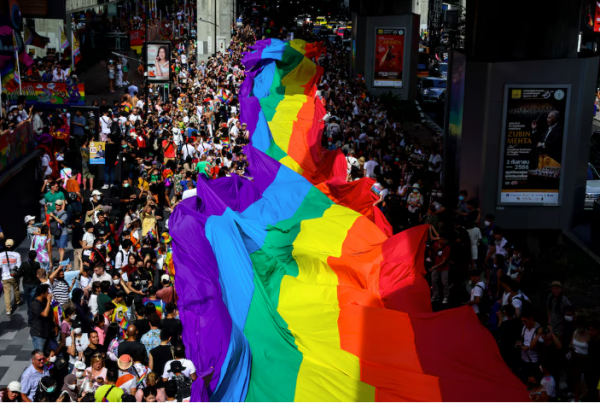Does Pheu Thai-led coalition spell death for the red-shirt movement?

Pheu Thai’s recent decision to embrace parties linked with the 2010 bloody military crackdown on red-shirt protesters may have shaken many members of the movement. However, it has far from destroyed its spirit.
“The red shirts have existed and will continue to exist,” affirmed Thida Thavornseth, a former leader of the United Front for Democracy against Dictatorship (UDD), the group that led the red-shirt movement for more than a decade.
While noting that the movement got behind the Thai Rak Thai (TRT) Party and its reincarnations, People’s Power and Pheu Thai, Thida prefers to see “red” as synonymous with the struggle against injustice. The red shirts, she explained, are people who want to secure power for the people.
“I can tell you there are still many such red shirts in the country,” she said.
Who are the red shirts?
Thida said red shirts can be divided into many groups – those driven by ideology, those who admired TRT, those who received support from TRT lawmakers, and those who worked as TRT canvassers.
But those who have continued being politically active and pushing for democratic goals are the ones who form the ideological core of the movement, she added.
“When the time is right, these red shirts will emerge again to push for change. Of course, they won’t be led by Pheu Thai or by those loyal to Pheu Thai.”
Birth of the movement
The red-shirt movement was born after the elected TRT-led government headed by Thaksin Shinawatra was ousted in a military coup in 2006. Thaksin fled the country in 2008 and lived in self-imposed exile until he returned to Thailand last week to face jail terms stemming from his time in power. He landed in Bangkok on August 22 and was immediately taken to jail, before being moved to the Police General Hospital later that night due to reported health problems.
The red shirts began rallying in 2006 under the Democratic Alliance against Dictatorship (DAAD), which was later renamed the UDD. While the movement protested on the streets, TRT fought in Parliament. After TRT was banned and dissolved in 2007, the red shirts got behind its reincarnation to continue their stand against military rule and demand democratic reform.
Pheu Thai’s stance and the reds
Although they were never part of Pheu Thai, the red shirts placed their hope and faith in the party, Thida said.
“At the very least, the red shirts hoped Pheu Thai would change Thai society for the better and bring justice for the red-shirt protesters killed in the 2010 crackdown.”
However, those hopes have vanished now that Pheu Thai has joined hands with parties who nominated two ex-generals linked with the crackdown as PM candidates. Red shirts now fear justice for the 2010 killings will never be achieved.
Was the struggle in vain?
Thida answers this question with a firm “no”. She insists the red-shirt movement has been successful in mobilizing people with an ideology and fostering progressive thought.
“Those with a progressive mindset are still around. They are ready to join protests and demonstrations that share the same causes. They are also happy to join the new-generation protesters, not lead them, while they share the same goals.”
She added that the May 14 election result showed that red shirts will vote for any party that shares their beliefs. Thida pointed to the shift of support from Pheu Thai to the liberal Move Forward Party as evidence that red shirts are not devoted to any single party.
Still red on the inside
A red-shirt who was among the last to leave the protest site at Ratchaprasong intersection on May 19, 2010, recently told Thai PBS World that she no longer considers herself a “red shirt”.
“I was part of the protest from March till May that year. During that time, I saw firsthand that the protesters had not been paid to die or fight for Thaksin. They went there in the hope of securing a better political system, so the quality of life in the country could improve,” the 68-year-old said.
The former red shirt said she would be willing to give up her life even now in return for the chance of a more just society.
Though she has now quit the movement, the retiree said she was proud of her time protesting with the red shirts and hoped they could draw lessons from Pheu Thai’s “betrayal”.
“I know that Pheu Thai has let them down. It’s painful, but that’s a lesson for them to learn. Politics is like this,” she said.
As for her goals in life now, she said she would continue to push for change and progress, pursuing any avenue of hope that she finds.
‘Changing roles’
Sarayut Tangprasert, a reporter at liberal-leaning outlet Prachatai, sees the red shirts as strong believers in representative democracy. He noted that rural people who form the movement’s core benefited from the 1997 Constitution and TRT policies like universal health coverage.
“Over time, the red shirts have learned that by voting they can actually improve their lives, and they have joined many political movements,” he said.
Sarayut dates the beginning of the end of the red-shirt movement to the 2010 crackdown, with the final blow falling with the 2014 coup. “That’s when red shirts split and chose their own paths. Now, their political roles will definitely change,” he said.
Pheu Thai’s popularity problem
Pheu Thai’s popularity has plummeted by 62.24%, while Move Forward has risen to 62.39%, according to a recent survey by Sripathum University and D-vote. Other political parties have not suffered such huge fluctuations in support.
Though Move Forward won the last general election, it failed to form a government after the 250-member Senate appointed under the junta blocked its PM candidate.
The second-largest party, Pheu Thai, then dumped Move Forward and allied with former military-backed rivals including the United Thai Nation and Palang Pracharath parties to successfully form the government. The two parties nominated former coup-maker General Prayut Chan-o-cha and General Prawit Wongsuwan as their PM candidates respectively. Both Prayut and Prawit are thought to have had a hand in the 2010 crackdown, which claimed at least 90 lives.
“I have empathy for Pheu Thai, but I disagree with it. I’m also sad that it has formed a government in this way,” said Thida.
By Thai PBS World’s Political Desk






